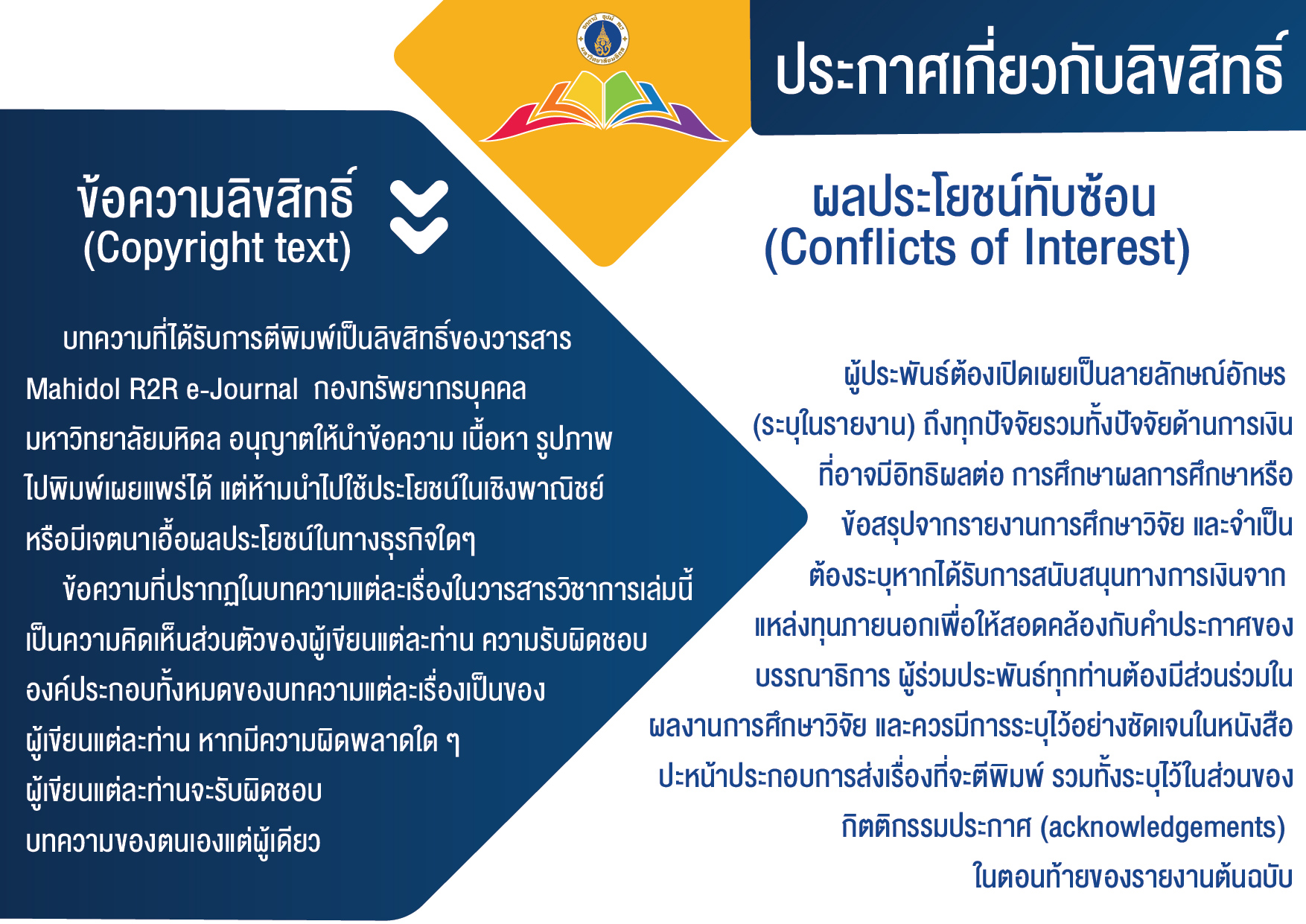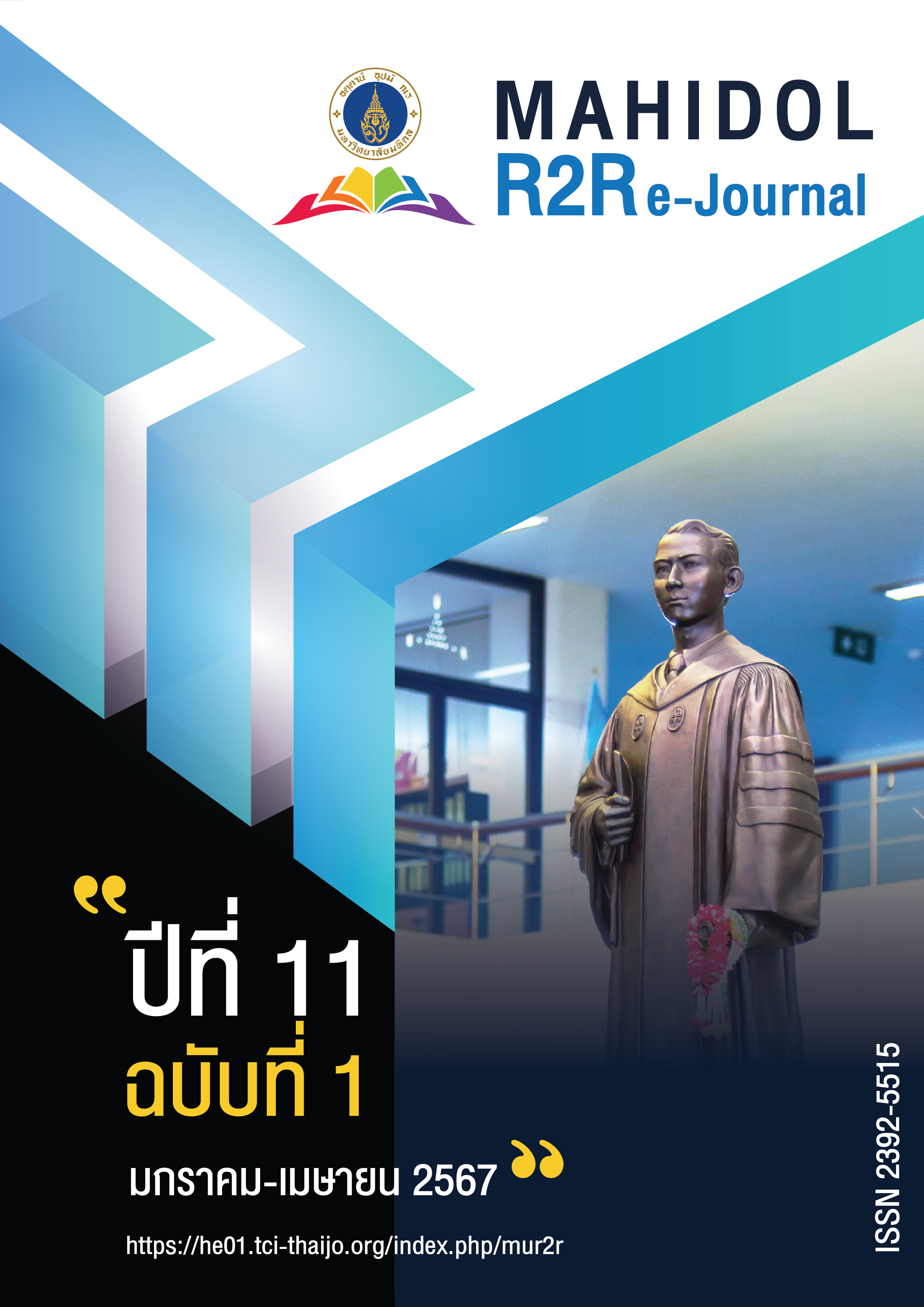การศึกษาความผิดแผกของยีน Thiopurine methyltransferase (TPMT) จากประสบการณ์การให้บริการทางห้องปฏิบัติการโรงพยาบาลศิริราช 18 ปี
DOI:
https://doi.org/10.14456/jmu.2024.7คำสำคัญ:
ยีน Thiopurine methyltransferase, ยากลุ่ม Thiopurine, เทคนิค AS-PCR, เทคนิค PCR-RFLPบทคัดย่อ
Thiopurine S-methyltransferase (TPMT) เป็นเอนไซม์ย่อยสลายยากลุ่ม thiopurine ได้แก่ 6-mercaptopurine (6-MP), 6-thioguanine (6-TG) ซึ่งเป็นยาที่ใช้อย่างแพร่หลายในการรักษาโรคมะเร็งเม็ดเลือด อย่างไรก็ตาม ผู้ป่วยที่มีความหลากหลายของ TPMT ทำให้ระดับเอนไซม์ TPMT ลดลง ผลข้างเคียงของการรักษาด้วยยาขนาดมาตรฐานของยากลุ่มนี้ทำให้เกิดพิษกดการทำงานของไขกระดูก
ห้องปฏิบัติการสาขาวิชาโลหิตวิทยาและอองโคโลยีเปิดให้บริการตรวจวิเคราะห์ Thiopurine S-methyltransferase (TPMT) variant จำนวน 5 ชนิดด้วยเทคนิค Allele-specific polymerase chain reaction (AS-PCR) ในการตรวจวิเคราะห์ TPMT*2 และเทคนิค PCR-restriction fragment length polymorphism (PCR-RFLP) ในการตรวจวิเคราะห์ TPMT*3A, *3B, *3C และ *6 จากการให้บริการ 18 ปีที่ผ่านมาตั้งแต่ปี พ.ศ.2547–2564 มีตัวอย่างเลือดคนไทยที่ส่งตรวจวิเคราะห์ TPMT variant ทั้งหมด 1,087 ตัวอย่าง จากผลการตรวจวิเคราะห์พบ genotype 3 แบบ คือ TPMT*1/*1, TPMT*3A/*1 และ TPMT*3C/*1 ที่ร้อยละ 93.84, 0.09 และ 6.07 ตามลำดับ ซึ่งพบ variant เพียง 2 ชนิด คือ TPMT*3A และ *3C เมื่อนับจำนวน allele ทั้งหมดพบชนิดของ allele ที่ร้อยละ 0.05 และ 3.04 ตามลำดับเมื่อเทียบกับ allele ปกติ (TPMT*1) ที่ร้อยละ 96.91
จากการศึกษาพบว่าการตรวจวิเคราะห์ยีน TPMT*3C พบมากที่สุดในประชากรไทยและสูงกว่าในประชากรทั่วไปในแถบเอเชีย ซึ่งการที่แพทย์ทราบข้อมูลความผิดแผกของยีน TPMT จึงเป็นประโยชน์ต่อการวางแผนการรักษาผู้ป่วยทำให้แพทย์สามารถปรับลดขนาดยาให้เหมาะสมกับผู้ป่วยแต่ละรายเพื่อให้เกิดผลข้างเคียงน้อยที่สุดและประสบความสำเร็จในการรักษาได้มากยิ่งขึ้น
เอกสารอ้างอิง
Appell, M. L., Wennerstrand, P., Peterson, C., Hertervig, E., & Martensson, L.-G. (2010). Characterization of a novel sequence variant, TPMT*28, in the human thiopurine methyltransferase gene. Pharmacogenetics and Genomics, 20(11), 700–707. https://doi.org/10.1097/FPC.0b013e3283402ee4
Booth, R. A., Ansari, M. T., Loit, E., Tricco, A. C., Weeks, L., Doucette, S., Skidmore, B., Sears, M., Sy, R., & Karsh, J. (2011). Assessment of thiopurine S-methyltransferase activity in patients prescribed thiopurines: a systematic review. Annals of Internal Medicine, 154(12), 814–823, W-295–298. https://doi.org/10.7326/0003-4819-154-12-201106210-00009
Chang, J.-G., Lee, L.-S., Chen, C.-M., Shih, M.-C., Wu, M.-C., Tsai, F.-J., & Liang, D.-C. (2002). Molecular analysis of thiopurine S-methyltransferase alleles in South-east Asian populations. Pharmacogenetics, 12(3), 191–195. https://doi.org/10.1097/00008571-200204000-00003
Collie-Duguid, E. S., Pritchard, S. C., Powrie, R. H., Sludden, J., Collier, D. A., Li, T., & McLeod, H. L. (1999). The frequency and distribution of thiopurine methyltransferase alleles in Caucasian and Asian populations. Pharmacogenetics, 9(1), 37–42. https://doi.org/10.1097/00008571-199902000-00006
Coulthard, S., & Hogarth, L. (2005). The thiopurines: an update. Investigational New Drugs, 23(6), 523–532. https://doi.org/10.1007/s10637-005-4020-8
Evans, W. E., Hon, Y. Y., Bomgaars, L., Coutre, S., Holdsworth, M., Janco, R., Kalwinsky, D., Keller, F., Khatib, Z., Margolin, J., Murray, J., Quinn, J., Ravindranath, Y., Ritchey, K., Roberts, W., Rogers, Z. R., Schiff, D., Steuber, C., Tucci, F., … Relling, M. V. (2001). Preponderance of thiopurine S-methyltransferase deficiency and heterozygosity among patients intolerant to mercaptopurine Journal of Clinical Oncology, 19(8), 2293–2301. https://doi.org/10.1200/JCO.2001.19.8.2293
Green, M. R., & Sambrook, J. (2012). Molecular cloning: A laboratory manual (4th ed.). Cold Spring Harbor Laboratory Press.
Hiratsuka, M., Inoue, T., Omori, F., Agatsuma, Y., & Mizugaki, M. (2000). Genetic analysis of thiopurine methyltransferase polymorphism in a Japanese population. Mutation Research, 448(1), 91–95. https://doi.org/10.1016/s0027-5107(00)00004-x
Hon, Y. Y., Fessing, M. Y., Pui, C. H., Relling, M. V., Krynetski, E. Y., & Evans, W. E. (1999). Polymorphism of the thiopurine S-methyltransferase gene in African-Americans. Human Molecular Genetics, 8(2), 371–376. https://doi.org/10.1093/hmg/8.2.371
Hongeng, S., Sasanakul, W., Chuansumrit, A., Pakakasama, S., Chattananon, A., & Hathirat, P. (2000). Frequency of thiopurine S-methyltransferase genetic variation in Thai children with acute leukemia. Medical and Pediatric Oncology, 35(4), 410–414. https://doi.org/10.1002/1096-911x(20001001)35:4<410:aid-mpo3>3.0.co;2-r
Kham, S. K. Y., Tan, P. L., Tay, A. H. N., Heng, C. K., Yeoh, A. E. J., & Thuan-Chong Quah (2002). Thiopurine methyltransferase polymorphisms in a multiracial asian population and children with acute lymphoblastic leukemia. Journal of Pediatric Hematology/Oncology, 24(5), 353–359. https://doi.org/10.1097/00043426-200206000-00006
Kim, S., Lee, H. W., Lee, W., Chun, S., & Min, W.-K. (2013). Validation of new allele-specific real-time PCR system for thiopurine methyltransferase genotyping in Korean population. BioMed Research International, 2013, 1-4. https://doi.org/10.1155/2013/305704
Kubota, T., & Chiba, K. (2001). Frequencies of thiopurine S-methyltransferase mutant alleles (TPMT*2, *3A, *3B and *3C) in 151 healthy Japanese subjects and the inheritance of TPMT*3C in the family of a propositus. British Journal of Clinical Pharmacology, 51(5), 475–477. https://doi.org/10.1046/j.1365-2125.2001.01371.x
Miller, S. A., Dykes, D. D., & Polesky, H. F. (1988). A simple salting out procedure for extracting DNA from human nucleated cells. Nucleic Acids Research, 16(3), 1215. https://doi.org/10.1093/nar/16.3.1215
Murugesan, R., Vahab, S. A., Patra, S., Rao, R., Rao, J., Rai, P., Gopinath, P. M., & Satyamoorthy, K. (2010). Thiopurine S-methyltransferase alleles, TPMT (*)2, (*)3B and (*)3C, and genotype frequencies in an Indian population. Experimental and Therapeutic Medicine, 1(1), 121–127. https://doi.org/10.3892/etm_00000021
Otterness, D., Szumlanski, C., Lennard, L., Klemetsdal, B., Aarbakke, J., Park-Hah, J. O., Iven, H., Schmiegelow, K., Branum, E., O’Brien, J., & Weinshilboum, R. (1997). Human thiopurine methyltransferase pharmacogenetics: gene sequence polymorphisms. Clinical Pharmacology and Therapeutics, 62(1), 60–73. https://doi.org/10.1016/S0009-9236(97)90152-1
Relling, M. V., Gardner, E. E., Sandborn, W. J., Schmiegelow, K., Pui, C.-H., Yee, S. W., Stein, C. M., Carrillo, M., Evans, W. E., Klein, T. E., & Clinical Pharmacogenetics Implementation Consortium. (2011). Clinical Pharmacogenetics Implementation Consortium guidelines for thiopurine methyltransferase genotype and thiopurine dosing. Clinical Pharmacology and Therapeutics, 89(3), 387–391. https://doi.org/10.1038/clpt.2010.320
Relling, M. V., Hancock, M. L., Rivera, G. K., Sandlund, J. T., Ribeiro, R. C., Krynetski, E. Y., Pui, C. H., & Evans, W. E. (1999). Mercaptopurine therapy intolerance and heterozygosity at the thiopurine S-methyltransferase gene locus. Journal of the National Cancer Institute, 91(23), 2001–2008. https://doi.org/10.1093/jnci/91.23.2001
Srimartpirom, S., Tassaneeyakul, W., Kukongviriyapan, V., & Tassaneeyakul, W. (2004). Thiopurine S-methyltransferase genetic polymorphism in the Thai population. British Journal of Clinical Pharmacology, 58(1), 66–70. https://doi.org/10.1111/j.1365-2125.2004.02112.x
Szumlanski, C., Otterness, D., Her, C., Lee, D., Brandriff, B., Kelsell, D., Spurr, N., Lennard, L., Wieben, E., & Weinshilboum, R. (1996). Thiopurine methyltransferase pharmacogenetics: human gene cloning and characterization of a common polymorphism. DNA and Cell Biology, 15(1), 17–30. https://doi.org/10.1089/dna.1996.15.17
Treesucon, A., Sripattanatadasakul, P., Siraprapapat, P., Vathana, N., Pongtanakul, B., Sanpakit, K., & Narkbunnam, N. (2017). Prevalence of thiopurine s-methyltransferase (TPMT) gene variants in Thai patients suffering toxicity from thioguanine-containing childhood leukemia protocols: First report of TPMT*3A in Thais. The Southeast Asian Journal of Tropical Medicine and Public Health, 48(2), 173-182. https://www.tm.mahidol.ac.th/seameo/2017-48-suppl-2/2017-48-supp2-173.pdf
Yates, C. R., Krynetski, E. Y., Loennechen, T., Fessing, M. Y., Tai, H. L., Pui, C. H., Relling, M. V., & Evans, W. E. (1997). Molecular diagnosis of thiopurine S-methyltransferase deficiency: genetic basis for azathioprine and mercaptopurine intolerance. Annals of Internal Medicine, 126(8), 608–614. https://doi.org/10.7326/0003-4819-126-8-199704150-00003
ดาวน์โหลด
เผยแพร่แล้ว
ฉบับ
ประเภทบทความ
สัญญาอนุญาต
ลิขสิทธิ์ (c) 2024 Mahidol R2R e-Journal

อนุญาตภายใต้เงื่อนไข Creative Commons Attribution-NonCommercial-NoDerivatives 4.0 International License.




